WEP Conducts 3rd Virtual Roundtable Discussion on Pandemic-Related Benefits for Labor
The UP College of Law/Law Center’s Workers and Employees Program (WEP) conducted its 3rd Round Table Discussion with the theme “Amidst a Crisis: Pandemic-Related Benefits for Labor” on February 12, 2021 from 1:00-3:00 p.m. Representatives from labor unions, officials of government agencies, a sectoral representative, labor law practitioners, and law students participated.
Formally opening the program, WEP Program Director, Prof. Patricia R.P. Salvador Daway revisited the accomplishments of the 2nd RTD and discussed the expectations for the 3rd RTD. This was followed by Atty. Emir V. Mendoza’s presentation of WEP’s proposed draft comprehensive pandemic benefits bill which was sourced from pending bills as well as existing laws and executive issuances.
The participants took turns in voicing out their concerns and suggestions to improve the consolidated pandemic-related benefits bill during the plenary session moderated by Prof. Arnold F. De Vera and Prof. E (Leo) D. Battad.
DOLE Undersecretary, Hon. Benjo Santos M. Benavidez recognized that the main objective of the program which is to make the laws inclusive. He remarked that many workers cannot avail of the benefits provided by the Labor Code due to the absence of employer-employee relationship, yet the COVID-19 disease does not choose who to infect. Further, he anticipated that the employers’ natural reaction on the proposed benefits would be to oppose its passage by enumerating the existing benefits already granted to employees. Considering the costs of these benefits on the side of employers, Usec. Benavidez underscored the need to incentivize the employers in order to ensure their compliance. Usec. Benavidez also called for the academe to help research on the issues on vaccination-vis-à-vis-termination and mandatory vaccination.
Mr. Narciso Dalumpines Jr. of Pag-Aalay ng Puso Foundation cautioned that should small-scale industries be included in the coverage, they might be forced to close. Prof. De Vera clarified that the comprehensive bill has no categorization, to which Usec. Benavidez agreed. The latter mentioned that the comprehensive bill will cover three additional benefits—hazard pay, pandemic leave, and mental health leave. He suggested that workers from small enterprises should likewise be covered. He also emphasized the need to comply with the standards provided by existing labor laws since they are the minimum set by the law. Prof. Daway suggested an Exception Clause to the bill to exempt small enterprises, similar to what is provided in the National Wages Productivity Act, but government should step in to subsidize the exempted group of employees. Prof. Battad emphasized that small enterprises and more importantly, their employees, are both currently experiencing financial difficulties. The bottom line of the bill must not result into a zero-sum, since the granting of the benefit to one party does not necessarily equate to the disadvantage of another.
Commenting on the proposed consolidated bill, Mr. Luis Corral of the Trade Union Council of the Philippines (TUCP) and Associated Labor Unions (ALU) said that there are already existing structures in laws that could have been invoked to allow paid pandemic leave, e.g., to tweak the National Internal Revenue Code to provide tax incentives to employers who provide paid pandemic leave; to expand the coverage of SSS sickness benefits to cover paid pandemic leave; to utilize the Productivity Incentives Law as an avenue for providing the said leave; or for ailing industries to go directly to DTI. Mr. Corral emphasized that pushing through with the consolidated bill would bring attention to the bloated cost component. It is their position that at this time, the government particularly the DOLE should bear the cost of providing paid pandemic leave to employees.
Mr. Rey Rasing of Philippine Metalworkers’ Alliance (PMA) Sentro shared the actual experiences of union officers with comorbidities of the National Union of Auto Workers who are restricted from reporting to work by their employers citing the prevailing alert levels, even if the union officers are already fully vaccinated. He raised concern about the effects of this practice on the social security of the workers, considering that the employers in such a case are not obligated to pay their contribution for workers who do not render any work at such times under the principle of no work, no pay.
Ms. Lois Oliva asked whether it would be appropriate to include wage subsidy to the comprehensive bill.
Mr. Corral suggested that WEP should have an Order of Battle prioritizing one or two benefits, rather than have the entire package. He argued for realism as regards the cost component and to consider the status of many industries to avoid resistance from businesses.
Dr. Camille Cruzada of the Institute for Occupational Health and Safety Development raised the issue on whether it would be appropriate to have a fixed amount of hazard pay or special risk allowance since there is a difference of wage rates in the different areas of the country. She suggested an additional provision on inspection to ensure that businesses faithfully comply with the rules on the availment of tax incentives. She also described the importance of the paid pandemic leave for workers who do not qualify for benefits under the SSS and Employees’ Compensation Commission, and the need for the government to reimburse employers for the paid pandemic leave.
Atty. Mendoza provided a synthesis of the comments and suggestions of the participants. Prof. Llasos, who earlier gladly welcomed the participants, closed the RTD with his heart-piercing remarks.
WEP is slated to conduct its next (4th) virtual RTD in March. It will focus on the revised draft-comprehensive bill which integrates all the comments and concerns raised during this 3rd RTD.

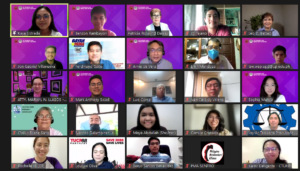
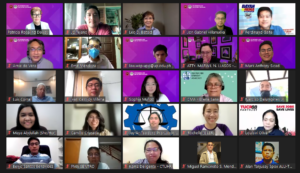
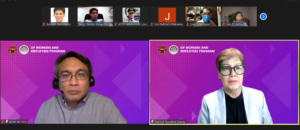
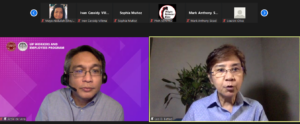
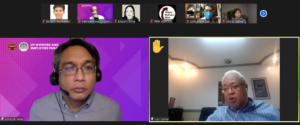
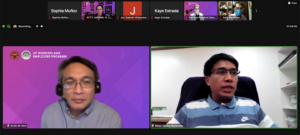
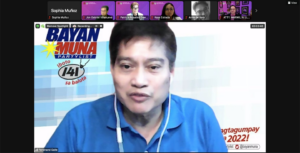






































































































 on the upper right corner to select a video.
on the upper right corner to select a video.